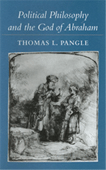• Home | • Curriculum Vitae: » PDF | • Return to Books & DVD


Political Philosophy and the God of Abraham
The Johns Hopkins University Press, 2003
This book brings back a lost and crucial dimension of political theory: the mutually illuminating encounter between skeptically rationalist political philosophy and faith-based political theology guided ultimately by the authority of the Bible. Focusing on the chapters of Genesis in which the foundation of the Bible is laid, Pangle provides an interpretive reading illuminated by the questions and concerns of the Socratic tradition and its medieval heirs in the Christian, Jewish, and Islamic worlds. He brings into contrast the rival interpretive framework set by the biblical criticism of the modern rationalists Hobbes and Spinoza, along with their heirs from Locke to Hegel. The full meaning of these diverse philosophic responses to the Bible is clarified through a dialogue with hermeneutic discussions by leading political theologians in the Judaic, Islamic, and Christian traditions, from Josephus and Augustine to our day. This book will be of interest not only to students and scholars of politics, philosophy, and religion but also to thoughtful readers in every walk of life who seek to deepen their understanding of the perplexing relationship between religious faith and philosophic reason.
Pangle treats the reader to a series of carefully conceived and masterfully executed set pieces on the central episodes and events of the book of Genesis. In chapter after chapter he invites the reader into a process of questioning, hypothesizing, weighing interpretive moves and their significance, and considering the implications of those moves for the ever-present and always overriding question (common to both philosophical inquiry and the Biblical text), "How ought one to live?" This is a book to be savored, to be read slowly and carefully, and then slowly and carefully again.... Pangle shows a deep and rich immersion in the rabbinic and philosophic commentary on Genesis throughout the ages. He makes the reader work, and work hard... Moreover, I cannot praise highly enough the extraordinary discussion that takes place in the 80-plus page section of endnotes. This is the rare book in which one may learn as much from the notes (in which the author invites his reader into a conversation about, not merely a recitation of, the main sources: classical, medieval, contemporary) as from the text itself.
-American Political Science Review
This wise book is of considerable merit and importance. It inquires into the intelligible relationship, if any, between that revelation found in the Hebrew bible and the tradition of political philosophy rooted in Socrates.
-Review of Metaphysics
Of all his excellent books, [Pangle] seems to have taken the greatest care in writing POLITICAL PHILOSOPHY AND THE GOD OF ABRAHAM . Every sentence, every phrase, every word counts.
-Claremont Review of Books
A far more sophisticated and erudite, but by no means less passionate, plea for the restitution of the Biblical vision of world order than is observable amongst the American evangelical right is found in Thomas Pangle's POLITICAL PHILOSOPHY AND THE GOD OF ABRAHAM . . . A tribute to the resources of the religious intellect.
-Muslim World
An enticing introduction to the richly provocative debate about fundamental questions of faith raised among the Bible's greatest students--Augustine and Aquinas, Ibn Ezra and Maimonides, al-Ghazali and Averroes, Luther and Calvin and an array of writers from ancient and modern philosophical traditions as well... The tension between theology and philosophy has been exacerbated of late: A change in the self-understanding of philosophy in modern times has led to an exaggerated rupture between science and faith that has been detrimental for both. Pangle's alternative response to the challenge of faith is not, to begin with, an attempt simply to explain away the experience of faith. He focuses where reason and revelation meet: on matters of justice and morality... . . . No one who follows Pangle's investigation could fail to be moved by the weight and force of the deeply serious moral world of the Bible.
-The Weekly Standard
Political Philosophy and the God of Abraham takes us a long way toward restoring the intellectual basis of a serious quarrel between faith and reason.
-The Public Interest
In this bold and original work,... Pangle's thoughtful discussions of philosophers and theologians brings modern political philosophy and the Bible into a rich and rewarding dialogue on issues such as justice and righteousness. Pangle's interrogation of scripture through the lens of political philosophy, forces us "moderns" to consider seriously its contribution to the question of "How ought I to live?" Likewise, Pangle's work grapples with the meaning of biblical and divine authority and its implications for political philosophy.
-Seminary Coop Bookstore Review
The encounter between faith and reason remains a central problem for man as he tries to come to grips with reality in its fullness. Political philosopher Thomas L. Pangle addresses this issue in a challenging manner.... This dense but rewarding book raises questions that people of faith need to confront as they do intellectual work on issues of justice.
-The National Review
The dialogue between philosophic rationalism and faith-based wisdom is here brought back to life with a depth and intensity that is unique in contemporary thought and discourse.
-Hillel Fradkin, President of Ethics and Public Policy Center
Pangle takes the reader on a fascinating tour of a period in Western intellectual history when modernist philosophy takes its leave of biblical authority.
-Choice
Review essays have appeared in The Good Society (2006--with the author's response) and in The Political Science Reviewer (2007).

